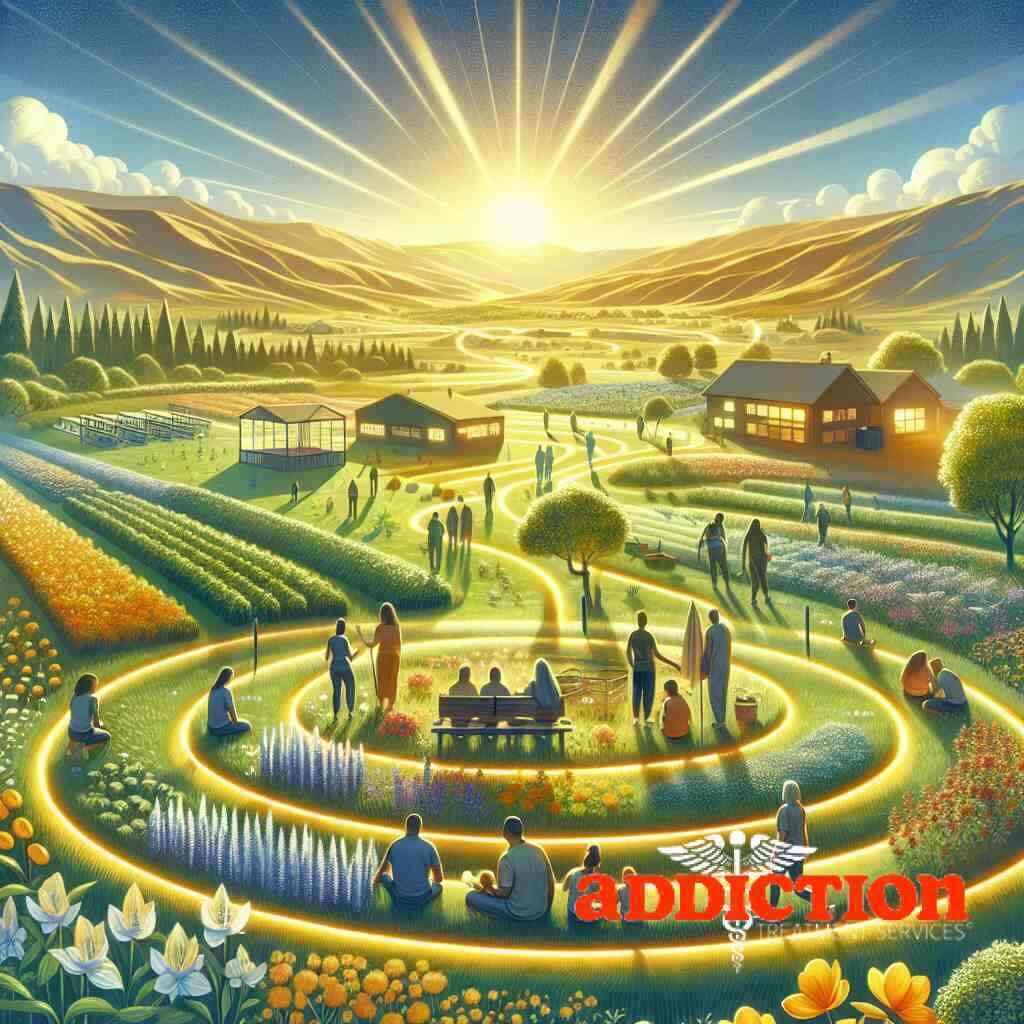 Posted On: 10/13/2025
Posted On: 10/13/2025Introduction: Understanding the Revitalization of Recovery
The Evolution of Therapy in Addiction Treatment Services
Over the decades, therapy’s role in addiction treatment services has transformed significantly, evolving from rudimentary approaches to more sophisticated interventions. The journey from traditional methods to the modern addiction therapy techniques captivating today’s clinical landscape is a testament to ongoing research and enhanced understanding of substance use disorders and substance misuse. Today, a range of therapies is used to address diverse needs, including cognitive behavioral therapy (CBT) and dialectical behavior therapy (DBT). Resources such as Addiction Treatment Services have epitomized these advancements by offering comprehensive insights and resources. They provide a platform for individuals to navigate through a plethora of addiction treatment centers and find tailored solutions.
Bridging Tradition with Modern Techniques
A critical aspect of modern therapy is its ability to integrate traditional practices with new methodologies. This bridging of approaches offers a more holistic and personalized addiction recovery experience. Therapeutic techniques in addiction have incorporated elements of psychoactive drugs and evidence-based models, emphasizing the syncretic integration of body, mind, and societal principles. For instance, using medication-assisted treatment alongside behavioral therapies fortifies the recovery process. The challenge remains to adapt these integrated therapy models to be accessible and effective across diverse treatment facilities. As part of this evolution, the role of mental and behavioral health services continues to expand, highlighting the necessity for a nuanced, multidimensional approach.
Redefining Success in Substance Use Disorders
Success in the treatment of substance use disorders is a multi-faceted concept that demands a redefinition beyond mere abstinence. It encompasses elements of personal growth, psychological resilience, and societal reintegration. Modern therapy initiatives, such as those provided by services near you, are reengineering the metrics of success in recovery. Emphasis is laid on empowerment through tailored addiction counseling and recovery support services. Visionary programs, like the ones available in Addiction Therapy Facilities in Massachusetts, showcase the potential for transformative therapy approaches to foster lasting change. Understanding the nuances of relapse prevention and sustainable practices is paramount in crafting a future where recovery is accessible and attainable for all seeking help in overcoming substance use challenges.
Innovative Approaches to Modern Therapy
Cognitive Behavioral Therapy: The Cognitive Revolution
Cognitive Behavioral Therapy (CBT) stands as a cornerstone of modern therapy for addiction treatment, heralding a cognitive revolution that has significantly impacted treatment outcomes. CBT focuses on identifying and changing negative thought patterns and behaviors that contribute to substance misuse. By empowering individuals to recognize these patterns, CBT helps in developing effective coping strategies, thus reducing the reliance on substances. In Cognitive Behavioral Therapy in Minnesota, the approach is highly regarded for its adaptability and evidence-based effectiveness, particularly in treating substance use disorders. The integration of CBT into various treatment programs highlights its role in addressing the psychological aspects of addiction, making it an indispensable tool in the arsenal of modern therapy techniques.
Cognitive Behavioral Therapy emphasizes structured, collaborative sessions between therapist and patient, promoting active engagement and personal accountability. This therapeutic model is instrumental in equipping individuals with skills to manage their cravings and avoid triggers. It encourages resilience and self-efficacy, essential components in sustaining long-term recovery and preventing relapse. As a result, CBT is frequently incorporated into intensive outpatient programs and residential treatment facilities, significantly enhancing their therapeutic outcomes. The flexibility of CBT allows for customization, ensuring that treatment is specifically tailored to each individual’s unique psychological and behavioral needs.
Dialectical Behavior Therapy: Balancing Extremes
Dialectical Behavior Therapy (DBT) is another innovative approach, initially developed to treat borderline personality disorder but now widely used in addiction treatment. DBT focuses on balancing acceptance and change, which is pivotal for individuals struggling with substance use disorders. Techniques such as mindfulness and emotion regulation are central to DBT, helping individuals develop a more balanced approach to life’s challenges. The Dialectical Behavior Therapy model underscores the importance of building a life worth living, reducing the allure of substance misuse as a coping mechanism.
Incorporating DBT in treatment facilities allows for a comprehensive approach that addresses both emotional and cognitive dysregulation. The therapy’s structured modules enhance emotional resilience, which is crucial for overcoming the emotional volatility often associated with addiction. Facilities like those in Therapy for Substance Disorders in New York have incorporated DBT to address co-occurring mental health disorders, emphasizing the need for integrated treatment methods. The outcomes of DBT are promising, showcasing its potential in not only managing addiction but also in fostering sustainable life skills and enhancing overall mental health.
Motivational Interviewing: The Power of Persuasion
Motivational Interviewing (MI) represents an innovative and empathetic approach to addiction therapy, focusing on strengthening a person’s motivation to change. MI is both collaborative and goal-oriented, aiming to resolve ambivalence and ignite intrinsic motivation to embrace recovery. The technique is highly effective in its subtlety, where therapists use open-ended questions and reflective listening to facilitate self-discovery and empowerment.
In practice, MI proves instrumental in the initial stages of treatment, especially when individuals might be skeptical about their ability to change or the need for change. Its application aids in building rapport and trust with patients, which is essential for delving deeper into the complexities of substance use disorders. The persuasive power of MI lies in its ability to highlight personal strengths and explore the potential benefits of change, fostering a more optimistic outlook toward recovery. Programs like Addiction Recovery Services in Florida leverage MI to promote gradual yet profound changes in the clients’ approach to recovery, underscoring its pivotal role in addiction treatment strategies.

Holistic and Integrated Therapy Methods
The Rise of Holistic Therapy Methods
In recent years, there has been a significant shift toward incorporating holistic therapy methods in the treatment of substance use disorders. This approach emphasizes healing the whole person-mind, body, and spirit-rather than just focusing on the symptoms of addiction. Activities such as yoga, meditation, and acupuncture are now commonly included in treatment programs, promoting well-being and stress reduction. These therapies help individuals build coping skills that enhance their ability to manage emotions and stress, which are often triggers for substance misuse. As a result, many addiction treatment centers are adopting these methods to offer more comprehensive care.
Holistic therapies also provide a complementary avenue to traditional treatments like medication-assisted treatment, thereby creating a balanced approach to recovery. The rise of holistic methods signifies a broader understanding of addiction and recovery, recognizing the role of lifestyle changes and mindfulness in sustaining long-term sobriety. For instance, centers offering Modern Therapy Practices in Iowa have integrated such practices to cater to varied individual needs. This evolution underscores the importance of diverse therapeutic modalities in enhancing the recovery process.
Exploring Personalized Addiction Treatment
An increasing emphasis on personalized addiction treatment is evident as therapy services strive to cater to the unique needs of each individual. Personalized treatment plans are crafted based on a thorough assessment of a patient’s history, substance use patterns, and co-occurring mental health conditions. This tailored approach ensures that treatment is relevant and effective, fostering a deeper engagement in the recovery process. Understanding that one size does not fit all, modern addiction therapy now factors in personal preferences, such as the choice between outpatient and residential treatment options.
Personalized treatment also involves close collaboration between healthcare providers and patients, enabling more responsive adjustments to therapy plans as recovery progresses. Facilities embracing this model, such as those offering Addiction Treatment Services, provide individuals with the tools necessary for their unique recovery journey. Emphasizing personalized care helps address underlying issues and promotes sustainable recovery by targeting specific areas that need attention.
The Integration of Therapies in Treatment Programs
Integrating different therapeutic modalities within treatment programs has proven to be a successful strategy in addressing complex substance use disorders. This approach combines evidence-based practices such as CBT, DBT, and MI with holistic therapies, resulting in more robust treatment plans. The integration allows individuals to benefit from multiple forms of therapy concurrently, addressing the psychological, behavioral, and physical aspects of addiction. For example, treatment programs like those at Addiction Therapy Facilities in Massachusetts blend these therapies to optimize recovery outcomes.
Bringing together various therapy types helps address not just the addiction but also any co-occurring disorders, leading to more comprehensive care. This synergy encourages a supportive environment where patients can explore different facets of recovery in a cohesive manner. The collaborative effort between different therapeutic interventions enhances the overall efficacy of the treatment process and supports the journey toward long-term wellness and sobriety.
Therapeutic Techniques and Behavioral Health Services
Innovative Therapy Practices in Modern Treatment Facilities
In contemporary addiction treatment facilities, innovative therapy practices are at the forefront of effective addiction therapy. These facilities often integrate diverse counseling techniques, creating a comprehensive treatment program that addresses the multifaceted nature of substance use disorders. A prominent practice includes the integration of modern addiction therapy with traditional methods, offering patients a more personalized experience. The blend of tangible skills from cognitive behavioral therapy (CBT) and the emotional regulation emphasis of dialectical behavior therapy (DBT) enhances overall treatment outcomes.
Furthermore, many modern treatment facilities, such as Substance Use Therapy in New Hampshire, implement cutting-edge technology and evidence-based therapies to ensure optimal patient engagement and recovery success. The emphasis on innovative therapies underscores the necessity to adapt and evolve current practices to meet the ever-changing needs of those battling addiction. This focus on innovation promotes sustained recovery by continuously improving therapeutic techniques to better serve individuals’ unique recovery journeys.
Transformative Therapy Approaches: Beyond Traditional Models
Transformative therapy approaches push the boundaries of traditional addiction therapy, encouraging more dynamic and holistic methods. These approaches often incorporate principles of mindfulness, art, and music therapy, allowing individuals to express emotions and process experiences creatively. By expanding beyond conventional models, transformative therapies provide a more immersive and client-centered treatment model, fostering an environment conducive to profound personal growth.
Facilities focusing on transformative techniques nurture recovery by embracing both the creative and analytical aspects of therapy for addiction. This comprehensive approach caters to varied learning and healing styles, crucial for individuals who may not respond well to standard therapies. At Innovative Addiction Therapy in Georgia, these transformative therapies are harmoniously integrated within the treatment program as part of a patient-centered approach, highlighting the shift towards more individualized care solutions.
Behavioral and Mental Health Services: The Synergy Effect
The synergy between behavioral and mental health services is fundamental in modern therapy for substance use disorders. This integration ensures a cohesive treatment approach, addressing both the psychological and physiological components of addiction. It is essential for comprehensive care that tackles co-occurring mental health conditions, often present in individuals with substance use disorders.
Programs that emphasize the blend of mental health integration with substance use treatment promote a more holistic healing process. By facilitating collaboration among mental health professionals, addiction counselors, and healthcare providers, these programs enhance the effectiveness of the recovery process. This integrated model is prominently seen in Therapy for Substance Disorders in New York, where services are designed to embrace the synergy effect. Such models contribute to more successful outcomes and sustainable recovery by ensuring all aspects of an individual’s health are addressed concurrently.
Therapy’s Role in Relapse Prevention and Sustained Recovery
Therapy and Relapse Prevention: Fortifying the First Step
The initial step in the addiction recovery process is critical, requiring robust strategies to prevent relapse. Therapy plays an integral role here, providing individuals with the necessary tools to manage cravings and avoid triggers. Cognitive Behavioral Therapy (CBT) and Dialectical Behavior Therapy (DBT) are particularly effective in this regard. These therapies focus on altering maladaptive thought patterns and behaviors, which can help mitigate the risk of relapse. Involving family members and leveraging peer support during this phase also enhances the effectiveness of these therapeutic interventions. Engaging in a Residential Treatment Center offers a structured environment, reducing exposure to relapse triggers while building a solid foundation for sustained recovery.
Therapists employ a variety of evidence-based techniques to fortify the recovery journey. By addressing underlying mental health issues, therapy enables individuals to develop healthier coping mechanisms. This holistic approach ensures longer-lasting success and significantly diminishes the chances of recurrence of substance use. With professional guidance and continuous support, patients learn to replace harmful behaviors with positive alternatives, thereby fortifying the first step toward recovery.
Sustaining Recovery through Intensive Outpatient Programs
Intensive Outpatient Programs (IOPs) are pivotal in maintaining and sustaining recovery momentum post-initial treatment stages. These programs offer flexibility for individuals to continue with daily responsibilities while receiving structured therapy. The blend of comprehensive counseling, group sessions, and workshops within IOPs supports a gradual transition from acute care to independent living. IOPs, such as those offering Innovations in Recovery Services, integrate modern therapy models, optimizing treatment outcomes and promoting autonomy in personal recovery journeys.
Research underscores the importance of continuity in care for sustained recovery, and IOPs cater precisely to this need. They encapsulate a realistic approach, acknowledging that recovery is an ongoing process rather than a one-time event. Personalized therapy sessions within these programs help address specific needs, fostering a deeper commitment to sobriety. The emphasis on relapse prevention through continuous therapy fortifies long-term success and empowers individuals to navigate life without resorting to substance use.
Therapy’s Transformation in Recovery Support Services
Recovery support services have undergone a significant transformation, integrating innovative therapy practices to adapt to evolving patient needs. These services encompass a range of supportive measures, including counseling, peer support, and educational resources, designed to maintain recovery post-treatment. Therapy’s transformation within these services is evident in the shift toward personalized approaches, acknowledging that addiction recovery success is unique to each individual.
The inclusion of holistic and integrated therapies, as seen in facilities like Kentucky Addiction Treatment Services, enhances the capability of recovery support services to address multifaceted recovery requirements. This evolution in therapy allows for a seamless blend of diverse modalities, ensuring that individuals receive the most comprehensive care possible. By focusing on personalized recovery paths and evidence-based practices, recovery support services play an indispensable role in fostering an environment where successful, sustained recovery is achievable.

Conclusion: Embracing the Future of Addiction Therapy
The Future of Therapy in Substance Use Disorders
The landscape of addiction therapy continues to evolve, with significant advancements and innovative approaches that show promise in tackling substance use disorders. Embracing technology and personalized treatment, the Future of Addiction Therapy is reimagined to optimize the recovery process. Integrating AI and data analytics for personalized therapy plans holds potential for revolutionizing how treatment is delivered, ensuring it adapts to individual progress and hurdles. This forward-thinking approach signals a profound shift in therapy strategies, making it possible to anticipate needs and forestall challenges before they materialize. Such innovation not only heightens the effectiveness of therapy but also supports sustainable recovery outcomes by proactively adapting to the evolving nature of substance use disorders.
Commitment to Modern Therapy and Recovery Success
A steadfast commitment to modern therapy is crucial for achieving recovery success in the battle against substance use disorders. Therapy must remain accessible, comprehensive, and continuously improved to meet the diverse needs of individuals seeking help. Addiction Treatment Services exemplifies this by providing a robust directory that assists in locating suitable therapy facilities, ensuring that individuals find personalized treatment that caters to their unique journey. This dedication to modern therapy drives the adoption of evidence-based methods and holistic practices, enhancing the efficacy of recovery programs. By keeping abreast with ongoing research and therapy innovations, addiction treatment centers can offer potent solutions tailored for success, guiding individuals away from previous patterns and towards a brighter and healthier future.
Empowering the Journey of Addiction Recovery Services
Empowering individuals on their recovery journey is at the heart of Addiction Recovery Services. This empowerment is achieved through a diverse array of support mechanisms, ensuring that individuals have access to the resources needed for lasting sobriety. From Drug Detoxification Methods to intensive outpatient programs, these services provide the scaffold necessary to support individuals through the intricate recovery process. Each step is fortified with therapeutic techniques designed to build resilience and foster autonomy, essential elements for long-term recovery. By prioritizing patient-centered care and integrating innovative therapy practices, Addiction Treatment Services paves the way for continuous growth and empowerment in the recovery community. This holistic approach underscores the transformative impact of therapy, creating a pathway not just to sobriety but to a fulfilling and empowered life beyond addiction.
Frequently Asked Questions
Question: How does modern therapy contribute to addiction recovery success, as discussed in the blog post ‘What is the Role of Modern Therapy in Addiction Recovery Success?’?
Answer: Modern therapy plays a pivotal role in addiction recovery success by integrating various therapeutic techniques that address the multifaceted nature of substance use disorders. Cognitive Behavioral Therapy and Dialectical Behavior Therapy help modify negative thought patterns and emotional dysregulation, essential for sustainable recovery. Motivational Interviewing strengthens intrinsic motivation, promoting a proactive approach to recovery. The blend of these modern addiction therapy methods enhances the efficacy of treatment programs, offering personalized solutions tailored to individual needs. At Addiction Treatment Services, we ensure these innovative therapy practices are accessible across numerous treatment centers to support your recovery journey effectively.
Question: Can you explain the significance of holistic therapy methods in addiction treatment and how they complement traditional therapies?
Answer: Holistic therapy methods are crucial in addressing the mind, body, and spirit’s intertwined needs in addiction recovery. Techniques such as yoga, meditation, and acupuncture foster emotional and physical well-being, offering balance and stress management essential in overcoming triggers for addiction. By complementing traditional therapies like medication-assisted treatment, holistic approaches create a well-rounded treatment strategy. Addiction Treatment Services includes centers that champion this integrated therapy approach, ensuring comprehensive care that respects every individual’s unique recovery requirements and boosts long-term addiction recovery success.
Question: How do personalized addiction treatment services enhance the overall recovery journey?
Answer: Personalized addiction treatment services enhance recovery by crafting individualized care plans based on each person’s history, substance use patterns, and co-occurring mental health conditions. This tailored approach fosters a deeper engagement in therapy, optimizing recovery outcomes. At Addiction Treatment Services, we connect individuals to treatment facilities that prioritize these personalized care strategies, recognizing that effective addiction therapy is not one-size-fits-all. This focus ensures that therapy and recovery paths align precisely with personal needs, improving the likelihood of sustained sobriety.
Question: How do integrated therapy models contribute to effective addiction therapy at modern treatment facilities?
Answer: Integrated therapy models enhance effective addiction therapy by combining multiple therapeutic modalities, such as cognitive behavioral therapy, motivational interviewing, and holistic methods. This comprehensive approach addresses the psychological, behavioral, and physiological aspects of addiction simultaneously, providing a more robust recovery framework. Modern treatment facilities incorporate this synergy, leading to improved therapeutic outcomes. Addiction Treatment Services ensures access to these integrated models, helping individuals receive balanced and effective care that guides them toward sustainable recovery success.
Question: What role does therapy play in relapse prevention and maintaining sustained recovery?
Answer: Therapy is instrumental in relapse prevention by equipping individuals with the tools to manage cravings and circumvent potential triggers. Evidence-based therapies like Cognitive Behavioral Therapy and Dialectical Behavior Therapy help alter harmful thought patterns and develop healthier coping mechanisms. Intensive outpatient programs offer continuity of care crucial for maintaining recovery momentum. Addiction Treatment Services connects you with resources that integrate these evidence-based treatment strategies, ensuring you are supported throughout your recovery process, fostering a commitment to long-term wellness and sobriety.


